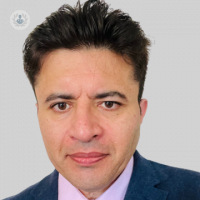Through the keyhole: What to know about knee arthroscopy
Written by:Knee arthroscopy is an innovative and minimally invasive surgical technique for diagnosing and treating various knee joint problems. We invited esteemed consultant trauma and orthopaedic surgeon Mr Saif Ul Islam to share his expert insight on the key advantages and applications of knee arthroscopy, including what can be expected from the recovery period following surgery and the potential risks to be aware of.

What is knee arthroscopy?
Knee arthroscopy is a minimally invasive surgical procedure which is performed to diagnose and treat various knee joint conditions. It involves inserting a small camera and specialised instruments through tiny incisions to view, repair, or remove damaged tissues.
When is knee arthroscopy recommended?
Knee arthroscopy is often recommended for individuals with persistent knee pain, swelling, or limited mobility that hasn't improved with non-surgical treatments. It can address issues such as meniscus tears, ligament injuries, cartilage damage, and loose fragments within the joint.
What are the advantages of knee arthroscopy?
Knee arthroscopy offers several benefits, including smaller incisions, minimal scarring, faster recovery, and reduced postoperative pain compared to traditional open surgery. It allows surgeons to examine and treat knee problems with greater precision.
What is the recovery process like following knee arthroscopy?
Recovery from knee arthroscopy varies depending on the specific procedure and individual factors. Typically, patients may need crutches for a short period and engage in physical therapy. Most can return to regular activities within a few weeks, although strenuous activities may take longer.
Is knee arthroscopy safe?
Knee arthroscopy is considered safe when performed by skilled orthopaedic surgeons. Like any surgery, it carries some risks and potential complications, which patients should discuss with their healthcare provider before undergoing the procedure.
How long does a knee arthroscopy procedure take?
The duration of a knee arthroscopy can vary depending on the complexity of the issue being addressed. On average, the procedure typically takes around 30 minutes to an hour. However, more complicated cases may take longer. Your surgeon will provide you with a more accurate estimate of the expected duration based on your specific condition.
Are there any potential risks associated with knee arthroscopy?
While knee arthroscopy is generally considered safe, it's important to be aware of potential risks and complications. These can include infection, bleeding, blood clots, and damage to surrounding structures.
Additionally, there is a small risk of anaesthesia-related complications. Your surgeon will discuss these risks with you during the preoperative consultation and take appropriate measures to minimise them.
If you require knee arthroscopy surgery and wish to schedule a consultation with Mr Islam, visit his Top Doctor profile today.


